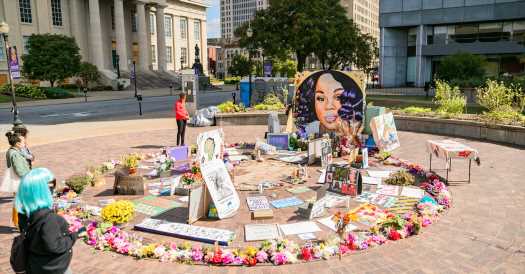Justice Dept. Finds Pattern of Discriminatory Policing in Louisville

WASHINGTON — The police department in Louisville, Ky., engaged in a far-ranging pattern of discriminatory law enforcement practices, the Justice Department said on Wednesday after conducting a two-year investigation prompted by the fatal shooting of Breonna Taylor by the police in 2020.
Attorney General Merrick B. Garland, appearing in Louisville alongside the city’s mayor and acting police chief, announced an agreement to overhaul practices he said had led to systemic discrimination against Black people, including Ms. Taylor. Ms. Taylor, a Black medical worker, was shot and killed by police officers assigned to a drug enforcement unit in March 2020 during a botched raid of her apartment.
In a damning 90-page report, investigators painted a grim portrait of the Louisville Metro Police Department, detailing a variety of serious abuses, including excessive force; searches based on so-called no-knock warrants; car stops, detentions and harassment of people during street sweeps; and broad patterns of discrimination against Black people and people with behavioral health problems.
“The L.M.P.D.’s conduct has undermined its public safety mission and strained its relationship with the community it is meant to protect and serve,” Mr. Garland said. “This conduct is unacceptable. It is heartbreaking.”
The Justice Department’s findings, he said, were succinctly captured by an unnamed Louisville police leader interviewed during the investigation:
“Breonna Taylor was a symptom of problems that we have had for years.”
Justice Department investigators interviewed hundreds of officers and community members and reviewed body camera video from dozens of officers in the 1,000-member department, which is responsible for the city of Louisville and surrounding metropolitan area.
The Killing of Breonna Taylor
The death of Breonna Taylor, a Black woman, in March 2020 fueled national protests over police brutality.
Mr. Garland said that his investigators uncovered instances of blatant racism against Black residents, including the disproportionate use of traffic stops in Black neighborhoods in the Louisville area — and even the use of epithets like “monkey,” “animal” and “boy.”
Kristen Clarke, the assistant attorney general for civil rights, said that the targeting of Black people for traffic stops and searches turned conventional law enforcement practices into “weapons of oppression, submission and fear.”
But the investigation uncovered an endemic pattern of dysfunction that went far beyond Ms. Taylor’s killing, finding widespread problems in the way the police handled investigations of domestic violence and sexual assault cases, including allegations of misconduct by law enforcement officers.
The abuse, Ms. Clarke said, extended to mentally ill people in the city, who were mistreated and mocked by officers. She cited one example in which a man with behavioral issues was arrested 25 times in two years, and in some of his encounters police “needlessly escalated the situation and used unreasonable force.” He later died in custody.
The investigation found that the police “routinely” used force that was disproportionate to the threats they faced, including the widespread use of neck restraints, stun guns and even dogs to subdue citizens. From 2016 to 2021, 71 dog bites were logged.
In one chilling incident detailed in the report, an officer ordered his dog to bite a Black 14-year-old boy — who was lying facedown in the grass — during a search after a home invasion.
“The officer deployed his dog off-leash — without giving any warning — and ordered the dog to bite the teen at least seven times,” the report said. “Despite the teen staying prone and pleading, ‘OK! OK! Help! Get the dog please!’ officers stood over him shouting orders for nearly 30 seconds while the dog gnawed on his arm.”
The child suffered serious injuries to his arm and back from the bites and had to be hospitalized.
Local officials said the report accurately reflected the complaints of citizens for years and vowed to restore trust in the department.
Mayor Craig Greenberg of Louisville, a Democrat who took office in January, called the abuses outlined in the report “a betrayal of the integrity and professionalism that the overwhelming majority of our officers bring to their job every day and every night.”
He added: “We will not make excuses. We will make changes.”
Current and former city officials have cooperated fully with investigators, Mr. Garland said, and have already begun carrying out many of the 36 recommended changes in the report.
The Louisville investigation is one of eight so-called pattern or practice investigations into potentially discriminatory policing around the country that have been opened under Mr. Garland.
In an unrelated action, the department also announced it was opening an examination of the Memphis Police Department’s special units, at the request of city officials, after the brutal beating death of Tyre Nichols, a Black man, during a traffic stop in January. The department is also working on a guide on how to organize and monitor such units.
Source: Read Full Article
